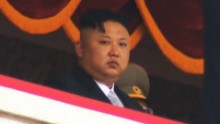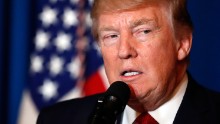On North Korea, Trump signals break with US-China policy
Story highlights
- China accounts for 80% of North Korea's foreign trade
- Trump is sweetening the pot, offering China better trade terms
Washington (CNN)President
Donald Trump, eager to stop rapid advances in North Korea's nuclear and
ballistic missile programs, is signaling a break with decades of US
policy as he looks to coax China into ramping up the pressure on North
Korea.
Trump's sweetening the
pot, offering China better trade terms if the Asian powerhouse takes
steps to put North Korea's provocative behavior to rest. China accounts
for 80% of North Korea's foreign trade and has significant political
leverage over North Korea.
"We have
tremendous trade deficits with everybody, but the big one is with
China. ... And I told them, 'You want to make a great deal?' Solve the
problem in North Korea. That's worth having deficits. And that's worth
having not as good a trade deal as I would normally be able to make," Trump told The Wall Street Journal in an interview last week, a day after he spoke with Chinese President Xi Jinping by phone.
The
interview was one of several in the last week in which Trump has
suggested China could win US concessions on trade in exchange for action
on North Korea. The stance is sparking concerns among former officials
in successive Democratic and Republican administrations who say Trump
appears to be abandoning a pillar of US efforts to urge China's
cooperation on North Korea.
But
Trump's diplomatic forays so far with Xi -- whom Trump hosted at his
Mar-a-Lago estate in Florida earlier this month -- are bearing tentative
signs of progress. China has turned away coal shipments and made more
forceful statements in recent weeks in an attempt to cool the ratcheting
of tensions in the region.
Still,
former White House officials are raising eyebrows at Trump's move and
insisting there is a reason why successive Democrat and Republican
administrations have kept the issues of trade and North Korea separate
in diplomacy with China.
For
decades, US officials have made clear to their Chinese counterparts that
the US won't barter economic or other foreign policy issues in exchange
for support on the North Korean issue -- sending the signal that the US
position on the issue was in the interests of global stability.
Abandoning that policy, according to officials from President George W.
Bush's and President Barack Obama's administrations, risks sending a
dangerous message to US allies and adversaries alike and sending the US
tumbling down a slippery slope.
By
keeping discussions focused squarely on North Korea and shared US and
Chinese interests in preventing war on the Korean Peninsula, US
officials have also avoided getting dragged into making other
concessions -- like recognizing China's territorial claims to Taiwan --
to win China's full support on North Korea.
"We
had made a pretty big point of making it clear that we weren't willing
to sacrifice our domestic economic interests for the sake of some
foreign policy issue," said Michael Froman, the US trade representative
under Obama. "We should be careful about 'paying' China -- in terms of
standing down on economic issues -- for doing what is in their interest
already. Conceivably, they'd prefer not to see instability and military
escalation on the Korean Peninsula."
Robert
Zoellick, the trade representative and later deputy secretary of state
in George W. Bush's administration, agreed, saying he "never conceded a
trade point with China to get assistance on a security topic," like
North Korea.
That's because doing
so risks weakening the US stance on the issue of denuclearization of the
Korean Peninsula and opens up the US to similar foreign policy gambits
from countries around the world seeking a sweeter economic relationship
with the US.
"It opens up the
thinking in everyone's mind around the world that they can haggle for a
better deal and get the US to give up on longstanding positions," said
Michael Green, the National Security Council's senior director for Asia
in the Bush 43 White House. "That is not going to instill confidence."
Past
administrations, though, have failed to stop, let alone slow down,
North Korea's nuclear program and ballistic missile developments. So
Trump has taken a different tack: seeking to incentivize China into
stepping up its role in the North Korean issue as he stressed the
urgency of confronting the threat.
"I
explained to the President of China that a trade deal with the US will
be far better for them if they solve the North Korean problem!" Trump
tweeted last week.
A senior White House
official insisted Trump was not offering a "specific quid pro quo" to
the Chinese, but rather signaling to China that cooperation on North
Korea would help create a more beneficial US-China relationship.
"What
the President is signaling is that Chinese cooperation in dealing with
North Korea is extremely important, and if we can't get good cooperation
on this urgent security threat, it'll be more difficult to cooperate
with China on a host of other areas in our bilateral relationship," the
official said. "If they were unwilling to help us with this, it's going
to make other aspects of our bilateral relationship potentially more
contentious."
It remains unclear
whether Trump's comments mesh with the administration's more fleshed-out
policy, but they've prompted a sharp response from some former
officials.
"Every administration
since Nixon has not fallen for this, and it's the kind of ploy that I
used to see on sophomore papers on East Asia in college," said Green,
the former Bush administration official, who added that the bartering
could send shivers up the spines of US allies.
"If
you are Japan or Taiwan, you start to wonder if your interests might
get traded," he added. "It introduces a level of uncertainty and
suggests that there are no principles to US policy."
It
remains unclear what Trump would be able to offer China on trade in
exchange for more decisive action on North Korea, but experts raised
questions about what economic terms the US could offer Beijing in
return. The US already faces a multi-billion dollar deficit with China,
and the US has struggled for years to create more open market access
conditions in China for US companies.
But
beyond making economic concessions to China, Trump's offer to barter
over the North Korean issue also risks nullifying one of the
Washington's biggest pieces of leverage in urging Chinese cooperation:
that stopping North Korea's nuclear program is also in China's interest.
China
has been less aggressive than the US in seeking to cool down North
Korea's aggressive development of nuclear weapons and ballistic
missiles. But experts agree that China also wants to prevent North Korea
from becoming a full-fledged nuclear power -- and certainly wants to
prevent a war on their southern border that could send millions of
refugees flooding into China and potentially risk bringing a US military
presence to China's borders.
Evan
Medeiros, the National Security Council's senior director for Asian
affairs under Obama, joined other former officials in questioning
Trump's attempt to barter the US-China trading relationship over the
North Korean issue.
"You want the Chinese to do the right on North Korea because it genuinely is a threat ... not as a favor," said Medeiros.






















No comments:
Post a Comment